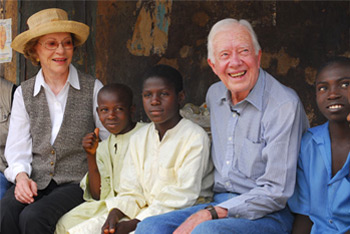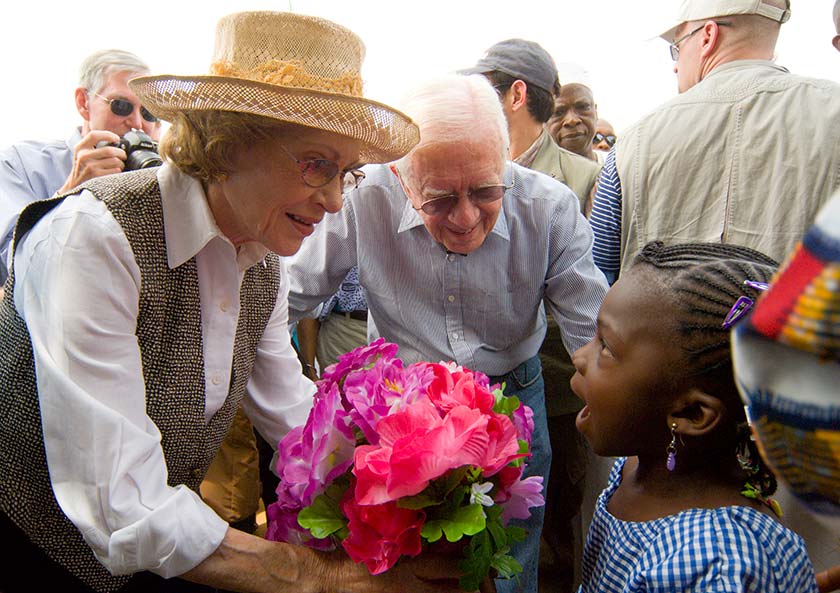The Carter Center and Beyond

After what she called “involuntary retirement” to Plains in 1981, her working relationship with her husband expanded. In 1982, they together founded The Carter Center in Atlanta, a nongovernmental organization dedicated to improving the quality of life for people at home and in the developing world through programs to alleviate suffering and advance human rights. As emissaries for the Center, the Carters circled the globe many times on nonpolitical campaigns to eradicate Guinea worm disease and other neglected tropical diseases, increase agricultural production in Africa, monitor elections in nascent democracies, urge greater compliance with international human rights standards, and resolve conflicts. As a full partner providing direction and vision for the Center, Mrs. Carter accompanied the former president as an active participant, observant note-taker, and thoughtful advisor on high-profile peace missions, including in Bosnia, Cuba, Sudan, Ethiopia, and North Korea.
She established the Carter Center’s Mental Health Program to continue her work to combat stigma and discrimination against people with mental illnesses and promote improved mental health care in the United States and abroad. She chaired the Carter Center Mental Health Task Force, a group of individuals in a position to affect public policy; hosted an annual gathering of national mental health leaders to foster greater consensus on pivotal national policy issues; and established the Rosalynn Carter Fellowships for Mental Health Journalism to encourage accurate, in-depth reporting about mental health issues.
In 2000, The Carter Center and Emory University’s Rollins School of Public Health established the Rosalynn Carter Endowed Chair in Mental Health to honor Mrs. Carter’s lifelong commitment to mental health advocacy. It is the first endowed chair in mental health policy at a school of public health, and its focus is on prevention of mental disorders and promotion of mental health.
In addition, Mrs. Carter’s devotion to service extended to other complementary areas. She saw the toll that caring for a loved one with mental illness had on a family and knew firsthand the burden of caring for a critically ill or aging family member. In 1987, Mrs. Carter founded the Rosalynn Carter Institute for Caregivers at Georgia Southwestern State University to support those who selflessly cared for others and build on her belief that “there are only four kinds of people in this world: those who have been caregivers, those who are currently caregivers, those who will be caregivers and those who will need caregivers.” The Rosalynn Carter Institute began by helping caregivers in Georgia through direct service programs. Today it serves all family caregivers, which number over 40 million people in the United States. Under Mrs. Carter’s leadership, the RCI has increased public awareness of caregiver needs, advanced public and social policies to support caregivers, and become a catalyst for change.
In her unwavering dedication to others, Rosalynn Carter reunited with Betty Bumpers to form Vaccinate Your Family (founded as Every Child By Two) to campaign for timely infant immunizations. She was honorary chair of the call-to-action campaign, Last Acts: Care and Caring at the End of Life, a national coalition of individuals and organizations advocating more compassionate care for those who are dying, and distinguished fellow of the Emory University Department of Women’s Studies. And for more than 30 years during Habitat for Humanity’s annual Jimmy and Rosalynn Carter Work Project, she would be found with her husband demonstrating advanced carpentry skills as they built homes for poor families.
As a lifelong resident of Plains, Mrs. Carter was an avid supporter of her hometown and a strong advocate for maintaining its historic integrity. She served on the boards of the Plains Historic Preservation Trust and the Friends of the Jimmy Carter National Historical Park. Mrs. Carter was an active member of Maranatha Baptist Church, where she served as a deacon.
 A young Nigerian girl presents Mrs. Carter with flowers of welcome during the Feb. 15, 2007, tour of health work in the community of Nasarawa. (Credit: The Carter Center)
A young Nigerian girl presents Mrs. Carter with flowers of welcome during the Feb. 15, 2007, tour of health work in the community of Nasarawa. (Credit: The Carter Center)Among her many honors were the “Into the Light” Award from the National Mental Health Association; the Award of Merit for Support of the Equal Rights Amendment from the National Organization for Women; the Notre Dame Award for International Service; the Foundation for Hospice and Homecare Lifetime Achievement Award; United Seniors Health Cooperative Senior Advocate Award; the U.S. Surgeon General’s Medallion; and the Presidential Medal of Freedom, America’s highest civilian recognition. In 2001, she was inducted into the National Women’s Hall of Fame.
Rosalynn Carter was the author of five books: her autobiography First Lady from Plains; Everything To Gain: Making the Most of the Rest of Your Life, a book co-authored with President Carter and inspired by their life after the White House; Helping Yourself Help Others: A Book For Caregivers (with Susan K. Golant); Helping Someone with Mental Illness: A Compassionate Guide for Family, Friends, and Caregivers (with Susan K. Golant), which was selected as the winner of the 1999 American Society of Journalists and Authors Outstanding Book Award in the service category, and Within Our Reach: Ending the Mental Health Crisis (with Susan K. Golant and Kathryn E. Cade).
Asked once how she would like to be remembered, she said, “I would like for people to think that I took advantage of the opportunities I had and did the best I could.”
Rosalynn and Jimmy Carter had four children and 12 grandchildren (one deceased)
Pages: 1 · 2
More Articles
- Hope: A Research-based Explainer by Naseem S. Miller, The Journalist's Resource
- The White House, President Joe Biden: Executive Order on Reducing Gun Violence and Making Our Communities Safer
- US Census Report: Young Adults Living Alone Report Anxiety, Depression During Pandemic
- By Nearly a 2-1 Margin, Parents Prefer to Wait to Open Schools to Minimize COVID Risk, with Parents of Color Especially Worried Either Way
- Grab That Museum Pass! Could Arts Engagement Have Protective Associations With Survival?
- From the CDC (Centers for Disease Control and Prevention) For the Public: What You Need to Know About Vaping
- GAO, VA Health Care: Improvements Needed in Suicide Prevention Media Outreach Campaign Oversight and Evaluation
- Strong Evidence that Hotter Weather Increases Both Suicide Rates and the Use of Depressive Language on Social Media
- For Addicted Doctors, Confidential Treatment That Works
- In An Absense of Action: Executive Actions to Reduce Gun Violence and Make Communities Safer






